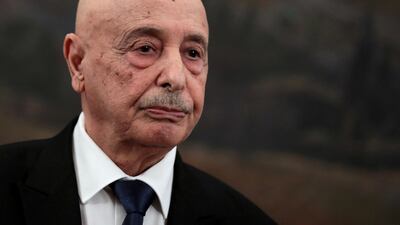The European Union has removed the speaker of eastern Libya’s House of Representatives from a sanctions blacklist in a boost to peace efforts before virtual European-hosted talks on Monday.
Aguila Saleh no longer faces EU travel bans and asset freezes imposed four years ago, the EU said on Friday. In recent weeks, he has become central to a new effort to agree to a ceasefire and restart talks between the divided administrations of east and west Libya after a year-long offensive by the HoR backed Libyan National Army to capture the capital was repelled.
"The delisting of speaker Saleh was agreed in light of his recent constructive engagement in support of a negotiated political solution to the Libyan crisis," an EU statement said.
After months of intransigence by both sides, prime minister of the western Tripoli-based Government of National Accord, Fayez Al Sarraj, announced a ceasefire offer after militias loyal to his administration backed by heavy Turkish support pushed back the LNA offensive to the strategic city of Sirte.
The offer was welcomed by Mr Saleh who made similar commitments to dialogue and both military and political delegations have met in recent weeks in Morocco and Egypt in preparation for wider UN-led negotiations.
With the new momentum, European powers see a chance to reassert their role in Libya – which has been in turmoil since the 2011 fall of Muammar Qaddafi.
The EU has been divided in its backing of opposing sides in the conflict between east and west.
France has expressed support for the LNA’s campaign to remove non-state armed actors and combat extremist groups, and Paris has hit out at Turkey for arming the militias and deploying forces, while Italy has condemned Field Marshal Khalifa Hafter’s men and backs Mr Sarraj.
A force for reconciliation
But the EU now agrees that Mr Saleh is a pivotal figure in the push to bring the two sides of the Libyan conflict together.
The United Nations and Germany are co-chairing a ministerial meeting on Monday bringing together world powers and other countries with interests in Libya’s long-running civil war in hopes of getting traction in the ceasefire talks.
Germany’s Deputy UN Ambassador Gunter Sautter said on Friday that the virtual meeting is “an important follow-up” to a conference of the same parties in Berlin on January 19 that approved a 55-point road map to peace and agreed to respect a much-violated arms embargo, hold off on military support to the warring parties, and push them to reach a full ceasefire.
Stephanie Williams, the top UN official for Libya, warned last month that the conflict-torn North African country is at "a decisive turning point," due to the fighting causing misery to its people being hit hard by the coronavirus pandemic.
Mr Sautter said there were “some encouraging developments in Libya” including talks on security, “the long-term agreements on transition, and progress on the question of oil exports.”
He said Germany hopes participants in Monday’s meeting – co-chaired by UN Secretary General Antonio Guterres and German Foreign Minister Heiko Maas – will renew their commitments to the Berlin road map and its implementation as well as “strengthen the United Nations as a key facilitator of the political dialogue in Libya.”
“We hope that they will call on the parties to accelerate efforts to achieve a ceasefire,” Mr Sautter said. “We hope that continuing blatant violations of the arms embargo will end.”
Before wider talks, the Libyan sides agreed to remove forces blockading oil ports, strangling the country’s main revenue source.
Two weeks in, the Opec member has seen a near three-fold increase in exports now hitting 270,000 barrels per day this week.
Exports are expected to rise even further, bar any new disruptions, with the reopening of the Marsa El Hariga, Brega and Zueitina terminals.

